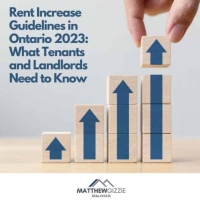
Rent Increase Guidelines in Ontario 2023: What Tenants and Landlords Need to Know
Wednesday May 10th, 2023
Rent Increase Guidelines in Ontario 2023: What Tenants and Landlords Need to Know
Renting a property in Ontario comes with its own set of rules and regulations, particularly when it comes to rent increases. The provincial government has implemented guidelines to protect tenants from exorbitant rent hikes and ensure affordable housing options. In this blog post, we will delve into the detailed guidelines for rent increases in Ontario, providing you with a comprehensive understanding of your rights and responsibilities as a tenant.
Rent Increase Limit:
In Ontario, rent increases are governed by the Residential Tenancies Act (RTA). The current guidelines state that landlords can increase rent once every 12 months for most residential rental units. However, this does not apply to specific types of properties, such as social housing or units that were first occupied after November 15, 2018.
Annual Rent Increase Guideline:
The province sets an annual rent increase guideline, which is the maximum percentage by which a landlord can raise the rent for most tenants each year. As of 2023, the guideline is set at 2.5%. Landlords must provide tenants with a written notice at least 90 days before the rent increase takes effect. It's important to note that landlords cannot apply a rent increase above the guideline without approval from the Landlord and Tenant Board if the unit was first occupied by any tenant prior to November 15, 2018. If the unit was first occupied by any tenant following November 15, 2018, no rent control applies, and the landlord can increase the rent by as much as they like, as long as they give 90 days’ notice and don’t increase rent more than once every 12 months.
Above Guideline Rent Increases (AGIs):
In certain situations, landlords may request an Above Guideline Rent Increase (AGI) if they can demonstrate that operating costs or capital expenditures warrant a higher increase. These could include major repairs, renovations, or increases in property taxes. However, landlords must obtain approval from the Landlord and Tenant Board before implementing AGIs.
Notice of Rent Increase:
Landlords are required to provide tenants with a written notice using the correct landlord form, an N1, Notice of Rent Increase. Or, for none rent-controlled units, an N2 Notice of Rent Increase.
Disputing a Rent Increase:
If a tenant believes that a rent increase is above the guideline or unjustified, they have the right to dispute it by filing an application with the Landlord and Tenant Board. The application must be filed within 30 days of receiving the notice of rent increase. The Board will then schedule a hearing to consider both the tenant's and the landlord's positions before making a decision.
Prohibited Rent Increases:
While rent increases are permitted within the guidelines, it's important to note that landlords cannot increase the rent during the first year of a new tenancy or when the tenant has been in the unit for less than 12 months. Additionally, rent increases cannot be used as a form of retaliation against tenants who exercise their rights, such as filing a complaint with the Landlord and Tenant Board.
Understanding the rent increase guidelines in Ontario is crucial for both tenants and landlords to maintain a fair and transparent rental market. By adhering to provincial regulations, tenants can protect themselves from unreasonable rent hikes, ensuring affordable and stable housing. Landlords, on the other hand, can navigate the process effectively, maintaining a positive relationship with their tenants while managing their properties responsibly.



Post a comment